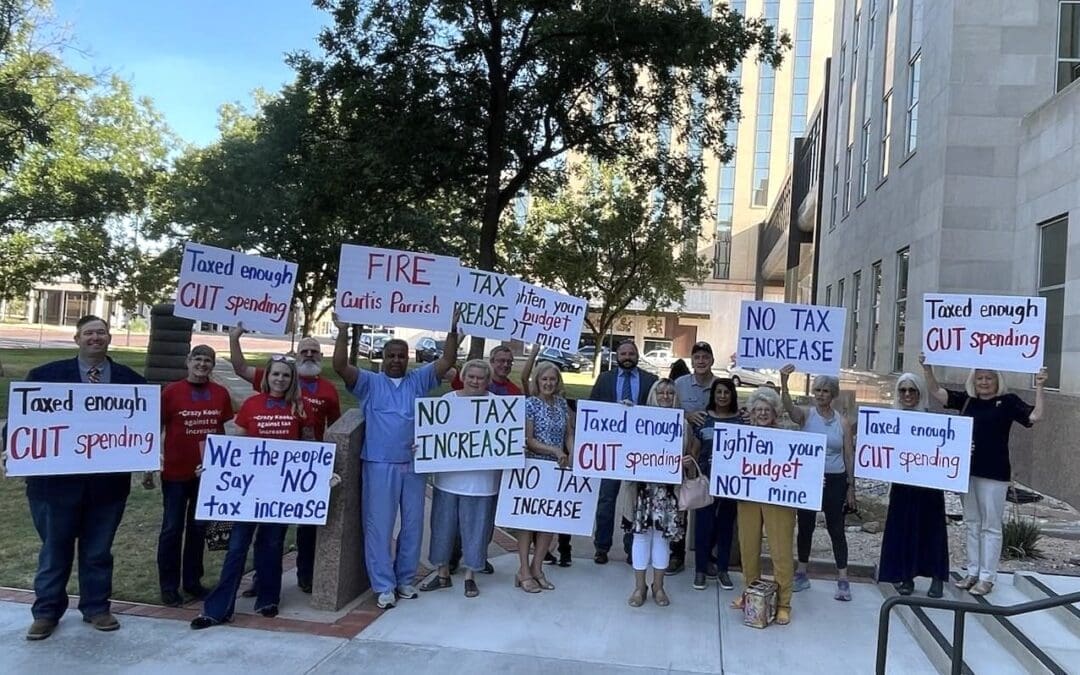Commissioners Jordan Rackler and Jason Corley stood with taxpayers who opposed the increase.


Commissioners Jordan Rackler and Jason Corley stood with taxpayers who opposed the increase.

“The integrity of the ballot is the No. 1 priority.”

We are one step closer to seeing the City of Lubbock join the growing number of cities across Texas that have passed enforceable ordinances outlawing abortion within their city limits.

“ELECTIONS NO! REVOLUTION YES!”

Grassroots react strongly to photos of Gov. Greg Abbott without a mask and not practicing social distancing at Globe Life Park in Arlington.
Voters in suburban Montgomery County repudiate the immature antics of left-wing activists.
Panhandle voters approved more debt for local taxpayers.
Payton swept the election, unseating incumbent Mayor Jerry Morales in the three-way mayoral race.
Mesquite City Council, Richardson school board among Dallas County’s local election results from November 5, 2019.
Results of November 5, 2019, elections in Kaufman County.
Results of the November 5, 2019, election in Collin County include a contested Princeton City Council race.
In addition to approving 9 of the proposed amendments to the Texas Constitution, voters in Tarrant County also approved over $2.7 billion in new taxpayer debt. Voters in the Azle school district are the one bright exception, where they soundly rejected their proposed $79.8 million bond.
Former Fort Worth City Councilman Clyde Picht outlines how and why Panther Island became such a mess, with taxpayers “left holding the bag.”
The massive $569 million Midland ISD bond election unofficial results showed a narrow 12 vote lead in favor of the measure: opponents weigh recount.
Half a billion in new debt and higher hotel taxes are now a reality for Central Texans.
The Austin American Statesman is calling on lawmakers to enact a slush fund that would attract more Hollywood liberals to Texas.
The Houston Chronicle recently reported that the town of Shenandoah Texas has hired taxpayer-funded lobbyists for $30,000 this session.
Once in a while the ma instream media hits the nail on the head and such is the case with a staff editorial in today's Lubbock Avalanche-Journal. This piece enclosed below in no uncertain terms urges the Legislature to return the surplus to taxpayers. Further, it points to the folly of simply shifting taxes and argues that rather than raise other taxes to pay for further property tax relief, the Legislature should simply utilize the surplus – the amount by which Texans have overpaid in taxes.
instream media hits the nail on the head and such is the case with a staff editorial in today's Lubbock Avalanche-Journal. This piece enclosed below in no uncertain terms urges the Legislature to return the surplus to taxpayers. Further, it points to the folly of simply shifting taxes and argues that rather than raise other taxes to pay for further property tax relief, the Legislature should simply utilize the surplus – the amount by which Texans have overpaid in taxes.
Governor Perry had a great line reported in the state's media outlets:
      "Only in Austin and Washington would returning $8 billion to citizens be considered spending."
That's a great point. The state's spending cap was called the "Texas Tax Relief Act," and was supported by an overwhelming vote of the people in a constitutional election. Most Texans probably assumed that if spending was kept under control, their taxes would be as well. It's doubtful any voter thought tax relief could be confused with spending, and it is reasonable to assume that they figured any overage would come back to them and not be used to grow government.
 Speaking at a Capitol news conference yesterday, Lt. Gov. David Dewhurst said "We don't have a 14.3 billion dollar surplus." He asserted that "when you look at promised property tax cuts out to 2011, we're looking at a balanced budget with just a modest increase in our expenditures." Dewhurst made similar remarks today at the Legislative Budget Board meeting where the LBB set the constitutional spending limit, which based on projected personal income growth, will allow a 13.11 percent increase in general revenue expenditures for the 2008-09 biennium.
Speaking at a Capitol news conference yesterday, Lt. Gov. David Dewhurst said "We don't have a 14.3 billion dollar surplus." He asserted that "when you look at promised property tax cuts out to 2011, we're looking at a balanced budget with just a modest increase in our expenditures." Dewhurst made similar remarks today at the Legislative Budget Board meeting where the LBB set the constitutional spending limit, which based on projected personal income growth, will allow a 13.11 percent increase in general revenue expenditures for the 2008-09 biennium.
The Abilene Reporter-News has a revealing piece today discussing how Abilene taxpayers support revenue and appraisal caps while local officials are frightened by the prospect. The most eye-opening quote is:
 Taylor County Commissioner Chuck Statler likened the county's situation to his personal budget at home: ''If your expenses continue to increase, why would you want to reduce your income?''
Taylor County Commissioner Chuck Statler likened the county's situation to his personal budget at home: ''If your expenses continue to increase, why would you want to reduce your income?''
The Galveston Daily News reported this month that the board of the Galveston Independent School District voted to pay the Austin consulting firm Moak, Casey & Associates up to $15,000 to lobby the Texas Education Agency (TEA) on their behalf. The  specific purpose of this arrangement is to get TEA to agree to a swap between the money the district will receive to buy down school property taxes and the money they will owe the state in Robin Hood payments. Suffice it to say, the article states that some questioned why district officials just don't call TEA themselves to find out whether this is feasible.
specific purpose of this arrangement is to get TEA to agree to a swap between the money the district will receive to buy down school property taxes and the money they will owe the state in Robin Hood payments. Suffice it to say, the article states that some questioned why district officials just don't call TEA themselves to find out whether this is feasible.

 State Senator John Carona (R-Dallas) is quoted by the Fort Worth Star-Telegram as saying that he'd rather "something wrong than do nothing." The sad thing is that in this case, the "wrong thing" he'd rather do is raise local taxes to pay for more wasteful mass transit spending, than "do nothing" which apparently includes making local governments squeeze more effiency out of their spending programs.
State Senator John Carona (R-Dallas) is quoted by the Fort Worth Star-Telegram as saying that he'd rather "something wrong than do nothing." The sad thing is that in this case, the "wrong thing" he'd rather do is raise local taxes to pay for more wasteful mass transit spending, than "do nothing" which apparently includes making local governments squeeze more effiency out of their spending programs.
The Houston Chronicle's Janet Elliott noted in her blog this week the creation of TFR.
As we reported earlier on this blog, we have urged the Legislative Budget Board (LBB) to adopt growth in gross state product instead of tot al personal incomes as the index for measuring growth in the state's economy for purposes of calculating the constitutional spending limitation. Making this change would mean that Texas politicians could increase state spending by at least $3-$6 billion dollars less in the 2008-09 biennium than they could otherwise.
al personal incomes as the index for measuring growth in the state's economy for purposes of calculating the constitutional spending limitation. Making this change would mean that Texas politicians could increase state spending by at least $3-$6 billion dollars less in the 2008-09 biennium than they could otherwise.